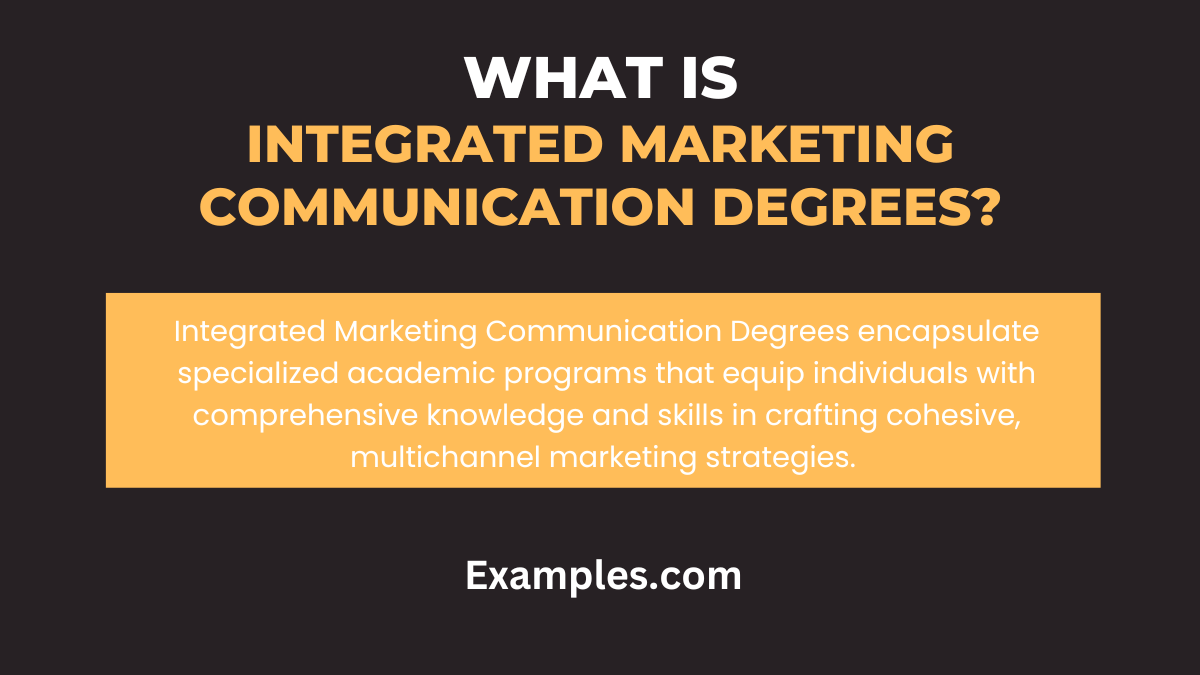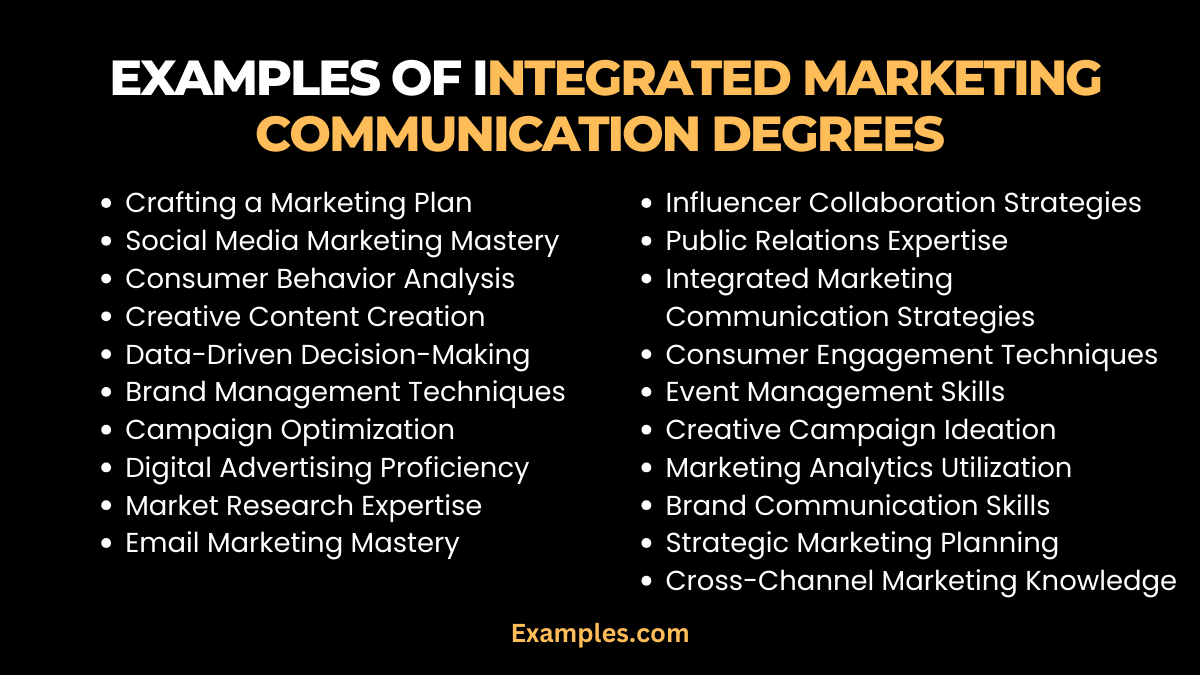19+ Integrated Marketing Communication Degrees Examples
Embark on a Journey of Knowledge with Integrated Marketing Communication Degrees: Discover the Definition, Origin, and Historical Evolution of IMC Degrees. Uncover Practical Examples and Proven Tips on How to Navigate and Succeed in This Dynamic Field. Gain Insight into the Tips and Strategies that Will Propel Your Integrated Marketing Communication Career Forward. Explore the Rich World of IMC Degrees for a Comprehensive Understanding of This Vital Marketing Discipline.
What is Integrated Marketing Communication Degrees?

Integrated Marketing Communication Degrees encapsulate specialized academic programs that equip individuals with comprehensive knowledge and skills in crafting cohesive, multichannel marketing strategies. This educational pursuit delves into the amalgamation of various communication tools to convey a unified brand message, preparing students for dynamic roles in the ever-evolving field of marketing. Explore the core principles and intricacies that define the landscape of Integrated Marketing Communication Degrees.
20 Examples Of Integrated Marketing Communication Degrees

Integrated Marketing Communication Degrees encapsulate specialized academic programs that equip individuals with comprehensive knowledge and skills in crafting cohesive, multichannel marketing strategies.
- Crafting a Marketing Plan: A degree program teaches strategic planning essential for devising effective marketing blueprints to engage audiences.
- Social Media Marketing Mastery: Learn the nuances of leveraging platforms like Instagram and Facebook for brand promotion.
- Consumer Behavior Analysis: Dive deep into understanding consumer motivations and behaviors, crucial for successful marketing campaigns.
- Creative Content Creation: Master the art of creating compelling content that resonates with diverse audience segments.
- Data-Driven Decision-Making: Employ analytics to make informed marketing decisions, optimizing strategies for better outcomes.
- Brand Management Techniques: Learn to cultivate, position, and safeguard a brand’s identity and reputation.
- Campaign Optimization: Understand the process of refining marketing campaigns for maximum impact and efficiency.
- Digital Advertising Proficiency: Acquire skills to run targeted online campaigns across various digital platforms effectively.
- Market Research Expertise: Learn the methodologies to gather and interpret data essential for informed marketing strategies.
- Email Marketing Mastery: Develop expertise in designing and executing impactful email campaigns to nurture leads.
- Influencer Collaboration Strategies: Study methods to collaborate with influencers for authentic brand endorsements.
- Public Relations Expertise: Master the art of managing relationships with the media to maintain a positive brand image.
- Integrated Marketing Communication Strategies: Understand the integration of diverse marketing tools into cohesive strategies.
- Consumer Engagement Techniques: Learn to create engaging experiences that foster strong customer connections.
- Event Management Skills: Acquire the expertise to organize and execute events for brand promotion.
- Creative Campaign Ideation: Develop innovative campaign ideas that capture audience attention effectively.
- Marketing Analytics Utilization: Use analytics to derive actionable insights for refining marketing strategies.
- Brand Communication Skills: Master effective communication to convey brand messages consistently.
- Strategic Marketing Planning: Acquire skills to create long-term marketing plans aligned with business goals.
- Cross-Channel Marketing Knowledge: Understand how to create unified marketing experiences across various channels.
Integrated Marketing Communication Degree Internships
Embarking on internships during an Integrated Marketing Communication degree is pivotal for translating academic knowledge into practical expertise. This guide elucidates the significance, benefits, and strategic approach to making the most of these internships.
- Understanding the Role of Internships in Learning: Internships bridge the gap between theory and practice, offering hands-on experiences crucial for honing communication skills in real-world settings.
- Strategic Selection of Internship Opportunities: Guidance on selecting internships strategically, aligning them with career goals, and diversifying experiences for a well-rounded skill set.
- Navigating the Internship Application Process: Insights into crafting compelling resumes, cover letters, and portfolios tailored for securing coveted Integrated Marketing Communication internships.
- Benefits of Integrated Marketing Communication Internships: A comprehensive look at the myriad advantages, including skill enhancement, networking, and potential job opportunities post-graduation.
- Strategies for Excelling During Internship Tenure: Guidance on making a lasting impact during internships, showcasing communication skills, and building strong professional relationships.
- Leveraging Internships for Skill Development: Specific communication skills honed during internships, such as effective collaboration, client communication, and strategic thinking.
- Mastering Multichannel Communication: Insights into how internships provide opportunities to work on multichannel communication strategies, an essential skill in today’s diverse media landscape.
- Real-world Application of Campaign Strategies: Examples illustrating how internships allow students to apply campaign strategies learned in the classroom to actual marketing initiatives.
- Building a Professional Portfolio: Guidance on using internship experiences to construct a robust professional portfolio that showcases practical application of communication skills.
- Navigating Challenges and Learning from Setbacks: Strategies for overcoming challenges commonly encountered during internships, transforming setbacks into valuable learning experiences.
What Can You Do With A Master’s In Integrated Marketing Communications?
Earning a Master’s in Integrated Marketing Communications (IMC) opens diverse and rewarding career avenues. This comprehensive guide explores the myriad opportunities and benefits associated with this advanced degree.
- Strategic Leadership Roles: A master’s in IMC positions graduates for leadership roles, allowing them to steer marketing and communication strategies with a strategic and holistic approach.
- Chief Marketing Officer (CMO): As a CMO, leverage your expertise to drive overall marketing initiatives, ensuring a cohesive and integrated approach across various channels.
- Brand Management: Master the art of brand stewardship, overseeing brand identity, reputation, and communication strategies to create lasting brand impressions.
- Digital Marketing Specialist: Become an authority in digital marketing, applying advanced techniques to enhance online presence, engagement, and overall digital strategy.
- Director of Marketing Communications: Lead and coordinate marketing communication efforts, ensuring alignment with organizational goals and maintaining consistent messaging.
- Public Relations Strategist: Apply your skills to shape and maintain a positive public image for organizations, managing relationships with media and stakeholders.
- Advertising Director: Oversee advertising campaigns, utilizing integrated approaches to maximize impact and reach target audiences effectively.
- Marketing Analytics Specialist: Leverage data-driven insights to optimize marketing strategies, making informed decisions that enhance overall campaign performance.
- Corporate Communication Manager: Manage internal and external communications, ensuring a unified and effective flow of information within the organization and to the public.
- Social Media Director: Master the art of social media management, creating impactful campaigns and fostering engagement across diverse social platforms.
What Can You Learn In An Integrated Marketing Communications Degree Program?
Integrated Marketing Communications (IMC) degree programs offer a comprehensive curriculum that equips students with a diverse skill set to thrive in the dynamic field of marketing and communication. Here’s a detailed guide on what you can expect to learn in an IMC degree program:
1. Strategic Communication Planning
- Overview: Understand the fundamentals of creating strategic communication plans.
- Skills Gained: Develop skills in analyzing market trends, identifying target audiences, and crafting effective communication strategies.
2. Consumer Behavior Analysis
- Overview: Explore the psychological aspects of consumer decision-making.
- Skills Gained: Acquire the ability to analyze consumer behavior, preferences, and purchasing patterns.
3. Multichannel Campaign Management
- Overview: Learn to orchestrate campaigns across various channels for maximum impact.
- Skills Gained: Gain proficiency in planning, implementing, and evaluating multichannel marketing campaigns.
4. Brand Management
- Overview: Dive into the principles of building and maintaining a strong brand identity.
- Skills Gained: Develop skills in brand positioning, brand messaging, and brand equity management.
5. Digital Marketing Strategies
- Overview: Explore the rapidly evolving landscape of digital marketing.
- Skills Gained: Understand SEO, social media marketing, content marketing, and other digital strategies.
6. Data Analytics for Marketing
- Overview: Delve into the role of data in refining marketing strategies.
- Skills Gained: Learn data analysis techniques to derive actionable insights for marketing decision-making.
7. Content Creation and Management
- Overview: Understand the art of creating compelling and engaging content.
- Skills Gained: Develop skills in content creation, curation, and management across various platforms.
8. Media Planning and Buying
- Overview: Explore the intricacies of planning and buying advertising space.
- Skills Gained: Learn how to develop media plans, negotiate with media outlets, and optimize media budgets.
9. Public Relations and Crisis Communication
- Overview: Understand the role of PR in shaping public perception and managing crises.
- Skills Gained: Develop skills in crafting press releases, managing media relations, and crisis communication.
10. Social Media Management
- Overview: Explore the impact of social media on modern communication.
- Skills Gained: Learn social media strategy development, community management, and analytics.
In conclusion, pursuing an Integrated Marketing Communications degree offers a transformative journey into the dynamic realm of marketing and communication. From strategic planning and brand management to digital strategies and ethical considerations, this comprehensive guide illuminates the diverse facets of IMC education. Armed with these skills, graduates embark on a career equipped to drive impactful and innovative marketing campaigns in today’s competitive landscape.



